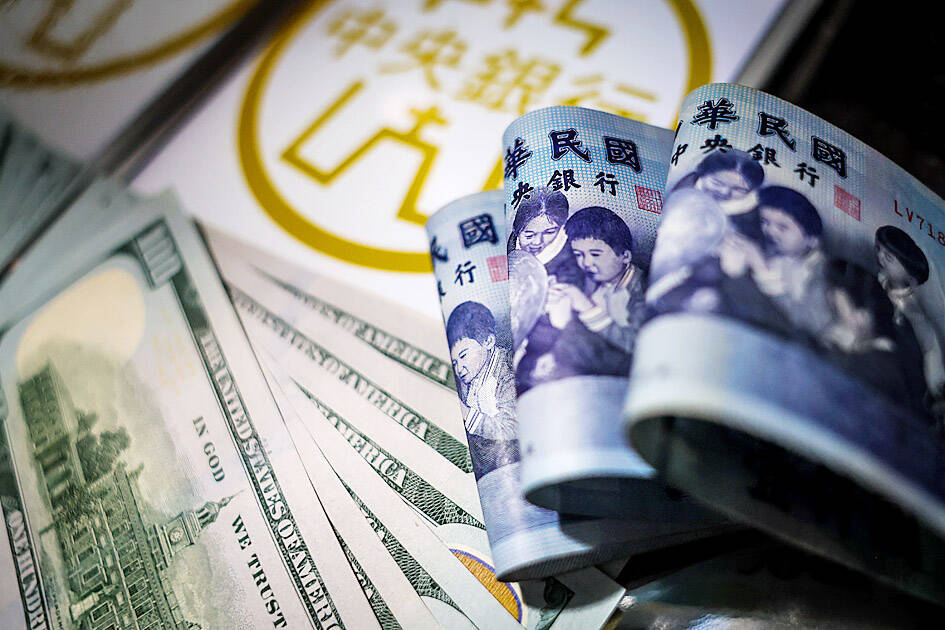The central bank yesterday said it bought US$13 billion more US dollars than it sold in the first half of the year to prevent the New Taiwan dollar from appreciating too much.
In a report submitted to the Legislative Yuan, the central bank said it bought US$13.25 billion more of the greenback than it sold from January to June to stabilize the exchange rate with the NT dollar and smooth volatility on the local foreign exchange market.
The report came out before central bank Governor Yang Chin-long (楊金龍) attended a hearing of the Legislative Yuan’s Finance Committee tomorrow.

Photo: CNA
In the six-month period, the US dollar fell 9.63 percent against the NT dollar after worries rose over uncertainties related to the policies of US President Donald Trump after he took office in January. As a result, the US dollar index, which tracks the greenback against the currencies of Washington’s six major trading partners, fell by 10.70 percent, the central bank said.
The US dollar’s weakness also reflected large funds moved by foreign institutional investors into the local market, which boosted the US dollar supply, it said.
The losses suffered by the US dollar appeared more apparent in May, when the central bank rushed to buy the greenback to cap the NT dollar’s appreciation, with the purchases boosting Taiwan’s foreign exchange reserves by about US$10.12 billion, the fifth-largest monthly increase in history.
The central bank previously said that the large purchase was intended to slow down the US dollar’s weakness in May.
Market watchers said that without the central bank’s intervention, the US dollar would have fallen further.
However, the central bank said it has adopted a two-way market intervention strategy, indicating that if the US dollar rises sharply, it would sell greenbacks to prevent the NT dollar from falling too much.
The central bank said that as of Tuesday, the US dollar had fallen 6.95 percent this year against the NT dollar, with foreign institutional investors tending to make net purchases on the local stock market.
It added that the stronger NT dollar reflects the sound economic fundamentals of the country.
The NT dollar’s fluctuations were still smaller than those of other major currencies such as the euro, the yen and the won, it said.

In Italy’s storied gold-making hubs, jewelers are reworking their designs to trim gold content as they race to blunt the effect of record prices and appeal to shoppers watching their budgets. Gold prices hit a record high on Thursday, surging near US$5,600 an ounce, more than double a year ago as geopolitical concerns and jitters over trade pushed investors toward the safe-haven asset. The rally is putting undue pressure on small artisans as they face mounting demands from customers, including international brands, to produce cheaper items, from signature pieces to wedding rings, according to interviews with four independent jewelers in Italy’s main

Japanese Prime Minister Sanae Takaichi has talked up the benefits of a weaker yen in a campaign speech, adopting a tone at odds with her finance ministry, which has refused to rule out any options to counter excessive foreign exchange volatility. Takaichi later softened her stance, saying she did not have a preference for the yen’s direction. “People say the weak yen is bad right now, but for export industries, it’s a major opportunity,” Takaichi said on Saturday at a rally for Liberal Democratic Party candidate Daishiro Yamagiwa in Kanagawa Prefecture ahead of a snap election on Sunday. “Whether it’s selling food or

CONCERNS: Tech companies investing in AI businesses that purchase their products have raised questions among investors that they are artificially propping up demand Nvidia Corp chief executive officer Jensen Huang (黃仁勳) on Saturday said that the company would be participating in OpenAI’s latest funding round, describing it as potentially “the largest investment we’ve ever made.” “We will invest a great deal of money,” Huang told reporters while visiting Taipei. “I believe in OpenAI. The work that they do is incredible. They’re one of the most consequential companies of our time.” Huang did not say exactly how much Nvidia might contribute, but described the investment as “huge.” “Let Sam announce how much he’s going to raise — it’s for him to decide,” Huang said, referring to OpenAI

The global server market is expected to grow 12.8 percent annually this year, with artificial intelligence (AI) servers projected to account for 16.5 percent, driven by continued investment in AI infrastructure by major cloud service providers (CSPs), market researcher TrendForce Corp (集邦科技) said yesterday. Global AI server shipments this year are expected to increase 28 percent year-on-year to more than 2.7 million units, driven by sustained demand from CSPs and government sovereign cloud projects, TrendForce analyst Frank Kung (龔明德) told the Taipei Times. Demand for GPU-based AI servers, including Nvidia Corp’s GB and Vera Rubin rack systems, is expected to remain high,